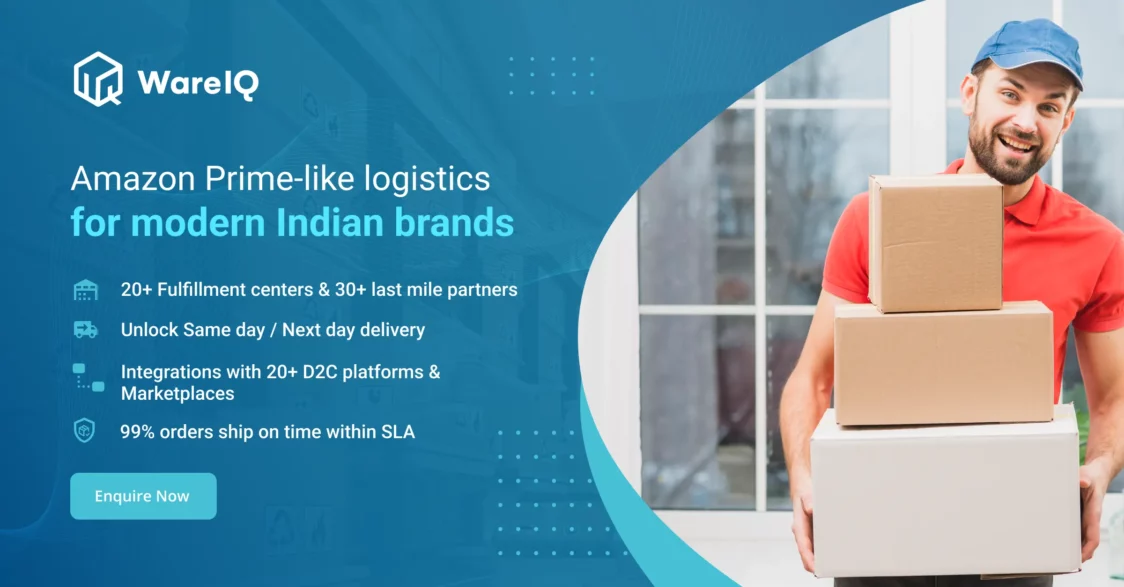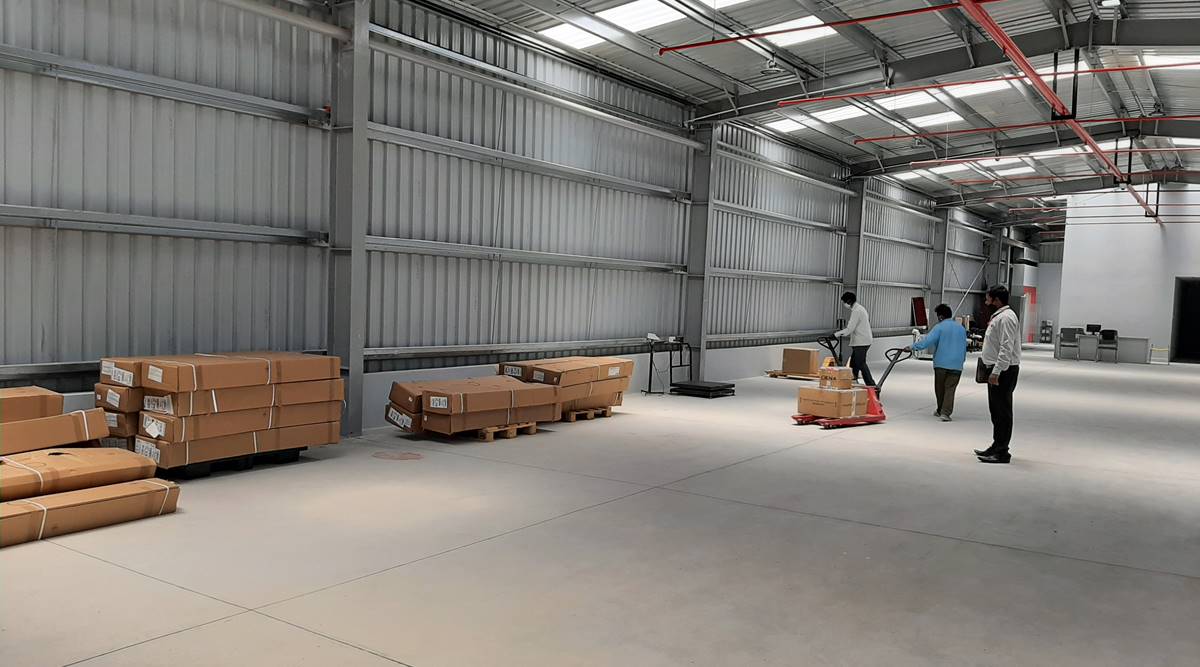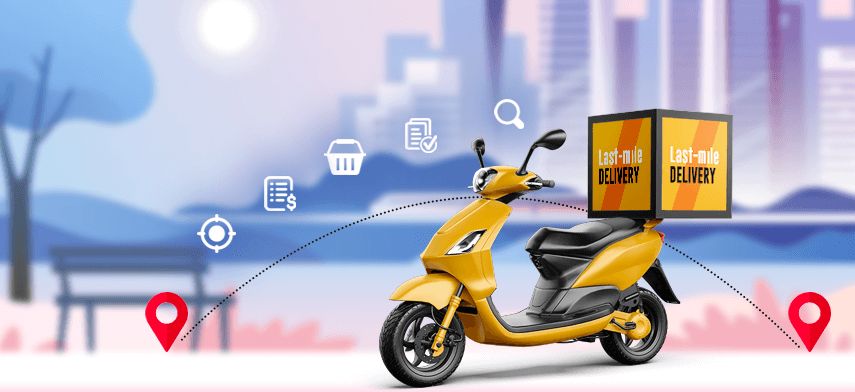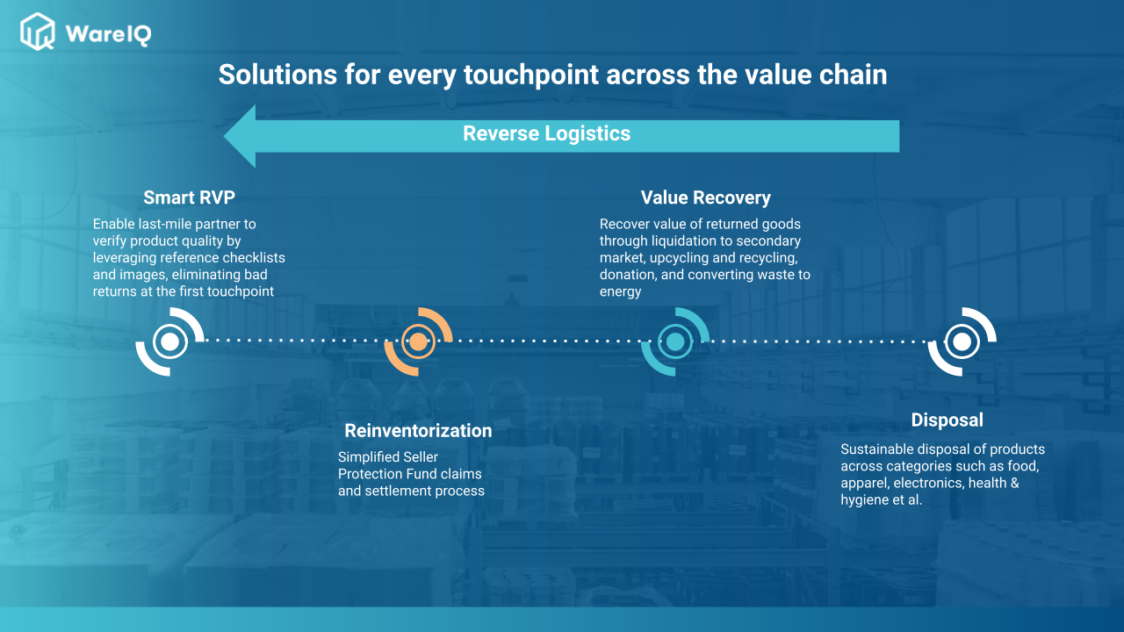eCommerce Logistics Guide: Definition, Processes, Factors to Evaluate and the 10 Latest Trends of Logistics in eCommerce in 2025

A change in consumer mindset encourages evolution in the way eCommerce retailers plan on serving them. Two years ago, what began as a force majeure became a habit, where customers were able to receive everything that they could possibly think of, right at their doorstep. The answer is vast as to what is logistics for eCommerce. The eCommerce industry’s heavy reliance on a solid supply chain backbone has triggered a revolution in the logistics industry. But what is eCommerce logistics and what are the factors that it encompasses? Let’s take a look.
- What is eCommerce Logistics?
- How Does eCommerce Logistics Work?
- How Does eCommerce Logistics Differ from Brick and Mortar Logistics?
- How to Choose the Right Type of eCommerce Logistics for Your Business in 2025?
- Top 10 Latest Trends in eCommerce Logistics in 2025
- Conclusion: Do You Need to Outsource Your eCommerce Logistics?
- What is eCommerce Logistics: FAQs
What is eCommerce Logistics?
eCommerce Logistics is the complete supply chain process undertaken by an eCommerce company to get their products from the seller or warehouse to the customers and back via reverse logistics if needed. All the proper systems and processes need to be in place for the millions of packages being shipped across the country to multiple different locations daily. eCommerce logistics begins with moving inventory from the origin point and ends at the customer’s destination once they take ownership of their order. There are different types of logistics contract logistics, 3PL logistics, and more.
WareIQ, an eCommerce fulfillment company, empowers online brands with a superior-tech platform to compete with Amazon like service levels by bringing their average delivery timelines from 5-10 days to 1-2 days.
How Does eCommerce Logistics Work?
As mentioned above, eCommerce logistics refers to the entire series of processes, from receiving an online order to the safe delivery of the package to the customer by the estimated date and time. The 2 major processes involved in eCommerce Logistics are listed below:
Forward Logistics
Inventory Management
This process is highly critical to keeping regular track of inventory. While stacking products in the warehouse or fulfillment center, warehouse management should occur where the high-demand products must be kept handy or easily reachable, followed by the goods where their accessibility is in proportion to their demand. eCommerce Logistics companies need to put in measures to ensure the safety and security of the inventory in their warehouses or storage spaces.
Smart Inventory Placement
Smart inventory placement refers to the automated recommendation of the best storage facility to place your inventory at based on a variety of factors specific to each SKU, such as seasonal demand, proximity to areas of high demand, market trends and more. This allows your inventory to be fulfilled faster and more efficiently every time an order is placed.
Order Preparation
The next step is to gather the inventory and prepare the final order per the customer’s request. The next step is packaging and labelling. Products are packaged in a single SKU or a kit with several SKUs before being labelled as per their batches and destinations. Many companies have adopted eco-friendly packaging and labelling to lure more aware customers.
Shipping Processes
Safe and timely delivery of orders is critical to the overall customer experience. This involves updating the customer regularly with the whereabouts of their package and ensuring that there are no errors or delays while shipping or transporting the product to their location.
Suggested Read: What are Shipping Labels?
Reverse Logistics
Returns Management
Around one-third of all products bought online are returned to eCommerce companies. The reverse logistics process comes into play when the customer or delivery agent triggers the return request. However, brick-and-mortar stores experience lower returns than online retail as the customers get the look and feel of the product before buying. However, both models employ a different set of logistical procedures to reach the final goal.
Value Recovery of Goods
This enables you to recover value from returned items by selling them on the secondary market, recycling and upcycling them, donating them and turning them into energy. This ensures that every returned product can fetch some amount of value rather than simply laying idle and eventually becoming obsolete.
Disposal of Unusable Items
For products that cannot be recovered or resold, they need to be disposed of in a healthy and environmentally conscious way. This involves the sustainable disposal of items for all categories, including food, clothing, electronics, health & hygiene, etc.
How Does eCommerce Logistics Differ from Brick and Mortar Logistics?
| Brick and Mortar Logistics | eCommerce Logistics | |
|---|---|---|
| Warehousing | They serve a local area and hence need smaller warehouses or storage spaces. | eCommerce logistics companies serve many cities, and most of them cater to customers across the country. Hence, they need larger warehousing spaces closer to customer demand hubs. |
| Inventory | As they usually serve customers in local areas, brick and mortar stores need less inventory as their demand is less than an eCommerce business because they only have to cater to one location as opposed to the whole country. | Since they serve national and sometimes international customers, eCommerce logistics companies need to be heavily stocked with multiple products from multiple sellers. As a result, their stock-keeping processes are more extensive than brick and mortar stores. |
| Distribution | Brick and mortar stores need transportation from the warehouse to their outlet and thus don’t need omnichannel flexibility and don’t require complex supply chain processes for distribution. | eCommerce logistics companies’ pickup and delivery processes vary and are much more complex and intricate. They employ multiple channels to ensure delivery to hard-to-reach locations in tier 3, 4, and 5 towns and villages. |
| Technology | Brick and Mortar stores usually don’t employ extensive software for their supply chain management as most processes are done physically, in-house and in just one location. | Serving a larger customer base comes with many challenges in managing orders, inventory, warehousing, distribution and returns. That’s why all eCommerce logistics companies rely on advanced software, backed by AI or ML, for each stage of the logistics process, to avoid unwarranted manual error and delays. |
| Logistical Expenses | Contrary to popular belief, brick and mortar stores don’t always prove to be more expensive. The major cost for these stores is the initial cost of setting up the shop and maintaining it, hiring labour, regular stocking etc. and logistics is limited to transporting items between the warehouse and the outlet. | The logistics costs of setting up an eCommerce business are significantly lower than Brick and Mortar retail. But companies begin to incur costs of infrastructure, shipping aggregation, returns, loss of customers, and website maintenance and development. And above all, attempting to keep up with emerging trends burns a major hole in their pockets. This is why it is advisable for these retailers to partner with dedicated eCommerce logistics companies. |
How to Choose the Right Type of eCommerce Logistics for Your Business in 2025?
Know Your Requirements
An eCommerce business has many requirements for which they need to hire an eCommerce logistics partner. However, shortlisting a 3PL logistics company for eCommerce, the retailer should have an understanding of their own requirements, the services that companies offer that they seek to partner with, and their available budget. An eCommerce company can ascertain which eCommerce logistics company would be the best fit for them through the following points:
- Customer Demand Per Day: This refers to how many orders the retailer receives in a day and how much they expect to receive in the future.
- Product Categorization: Grouping products into different categories helps companies better understand their eCommerce shipping requirements. For instance, perishable products require time and temperature-sensitive eCommerce logistics, while glassware demands fragile-safe transportation.
- Technological Requirements: It is important to understand what technological services you require for daily operations and which companies provide those services.
- Staff Requirements: This is determined by the amount of demand and what would be the maximum and minimum operational load.
- Speed of Order Fulfillment: This depends on the number of orders that need to be fulfilled per day and which parts of the country those orders need to travel to.
- Storage Space Needed: It is important for businesses to understand the scale of their operations and how much storage space they would need for available, unsold inventory.
Find Suitable Partners
After assessing all the requirements that are needed in different areas, eCommerce retailers can scout for eCommerce logistics companies that offer the same services. It is important to weigh your options as per the following criteria to find the best eCommerce logistics partner:
- Customer Service and Customisation: All businesses live to serve their customers. If the customer is dissatisfied, it affects sales and, in turn, the company’s growth. Online retailers need to check if the logistics partner can provide decent customer service, what their success rate is, and whether their services can be customised as per the customer and the product that the business caters to.
- Performance History: The performance of these companies influences the operations of an online retailer. Therefore the eCommerce business must collect all the relevant information on their past performance to analyse their track record and identify certain failures and how they were addressed. Same-day or next-day deliveries have become the norm these days, and the logistics company for eCommerce must be able to provide these services. If the eCommerce business has certain demands, the eCommerce logistics partner must keep a provision for exceptional distribution timelines like 10-minute deliveries without affecting the service quality.
- Omnichannel Presence: With severe competition coupled with rising customer expectations, it has become essential for businesses to employ multiple channels for order fulfillment. Before onboarding an eCommerce logistics provider, the business must ascertain if the 3PL company has an omnichannel presence to be able to reach as many customers as possible. Besides distribution, the partner should also provide multiple channels to ensure seamless communication and data flow between the two organisations.
- Technological Capability: This drives business operations productively. There are many tools utilised by 3PL eCommerce logistics providers, such as a Warehouse Management System (WMS), platforms to fulfill and track orders, inventory and distribution management, and any other cloud-based tech that empowers a business’ supply chain. Having a good onboard tech platform improves efficacy and productivity, leading to fewer errors and higher performance. Their system should also be able to integrate with other fulfillment services to enable seamless transfer of data and insights between multiple platforms, smooth order fulfillment, and customer service.
- Financial Strength: Without a solid financial backbone, no company can thrive. If an eCommerce logistics partner is monetarily weak, it can take down the eCommerce business’ supply chain, thus affecting the latter’s market image. Therefore, every company must thoroughly check the 3PL provider’s financial books before sealing the deal. The logistics provider for eCommerce must also be able to survive all kinds of business disruptions with stable financial backing. Having good relations with banks and financial institutions proves helpful in many different situations. If the logistics provider assures them of such support, they could be the ideal business partner.
- Scalability: The eCommerce logistics provider should have an expandable business model that inflates as the eCommerce business grows its reach. The logistics provider should be able to adapt to the growing demand and expansion of the retailer they have partnered with.
- Geographical Reach: Today, eCommerce businesses thrive on their reachability of tier 2, 3, 4, and lower towns and villages. The deeper and quicker their reachability, the more orders they can receive and fulfill, thus securing a better customer satisfaction ratio and obtaining access to new customers in different regions of the country.
- Overall Cost: The overall package deal offered by the eCommerce logistics provider is very important to observe. Your company should be able to afford them, with all the services they offer, rather than paying less for a company that does not offer important services. Companies need to strike the right balance between services and cost.
Top 10 Latest Trends in eCommerce Logistics in 2025
eCommerce Warehousing
This practice is focused on storing inventory and products for the daily operations of an eCommerce business. eCommerce warehouses are storage spaces dedicated to operating an online retail business. An eCommerce business needs to ensure that it operates and sets up storage closer to its customer hubs to reduce the time and expense of transporting goods. Partners like WareIQ help store the inventory closer to areas of high customer demand, thus enabling businesses to offer shortened delivery timelines.
Inventory Management
Many new trends in inventory management have emerged in light of the pandemic and other disruptions like the Ukraine-Russia war. A few such developments are the Just-in-Case method of managing inventory and the extensive automation of the supply chain. Simply termed as just-in-time inventory management.
Just-in-Time meant procuring the inventory as and when the demand arose. The Just-in-Case method pushes businesses to procure excess inventory to avoid hassles in case of a contingency like a lockdown or an interruption due to war. This inventory management trend has seen an upsurge in the past few months by eCommerce companies wary of being unable to meet the existing or increased customer demand due to unforeseen contingencies.
The shortage of workforce and other interruptions have pushed companies to look for measures that can support and maintain the speed and efficiency of the supply chain. Automating important processes is one such method. Advanced tech like AI and Machine Learning are driving the evolution of eCommerce logistics management systems like WareIQ. These tools enable real-time tracking of inventory nationwide which has pushed the efficacy levels higher, especially in the case of cross-country shipping.
Order Packaging & Labelling
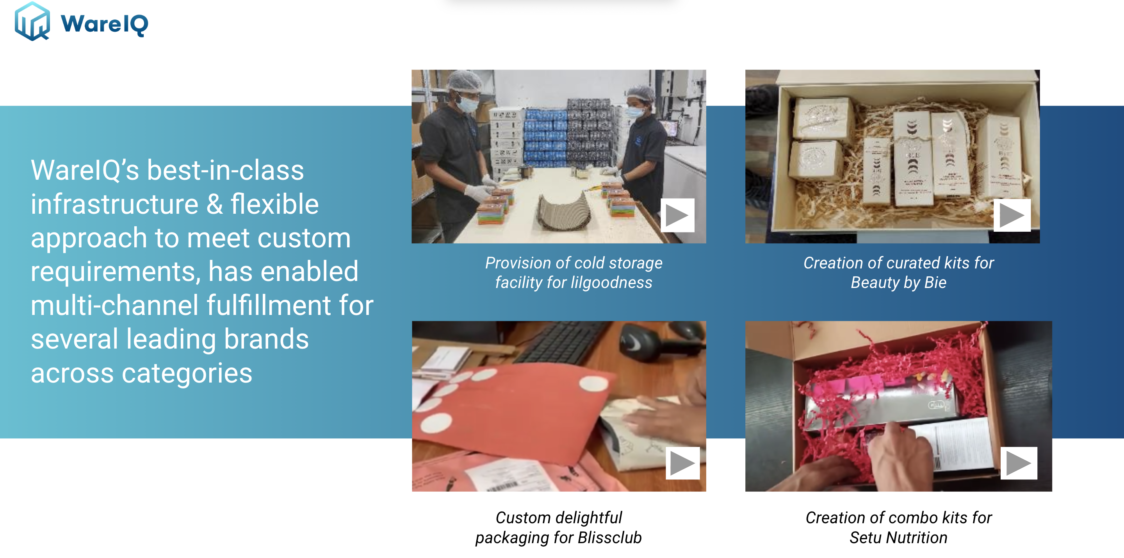
Sustainability is not the only trend catching up with eCommerce packaging; minimalistic design is also gaining mileage. Besides eco-friendly packaging material, companies prefer labels and designs with minimal amounts of text and designs. (All that is covered under custom packaging for eCommerce). This trend has taken the ‘Less is more opinion to the next level. For example, Apple’s plain white boxes usually outshine other manufacturers. Sending the orders in generic, uninspiring brown boxes will create an unwelcoming and impersonal client experience. Instead, choosing an eCommerce logistics firm that provides branded packaging services can help companies create a brand and raise the visibility of their business.
Besides just visual appeal, companies are also using packaging to communicate with customers. Adequate packaging needs three layers. When orders get punched, there’s a label printed and stuck on another two layers of packaging and then dispatched. eCommerce logistics companies provide a wide variety of packaging strategies. For instance, bubble foil, padded paper, and plastic emailer bags help to prevent the damage of goods during transportation.
Order Shipping
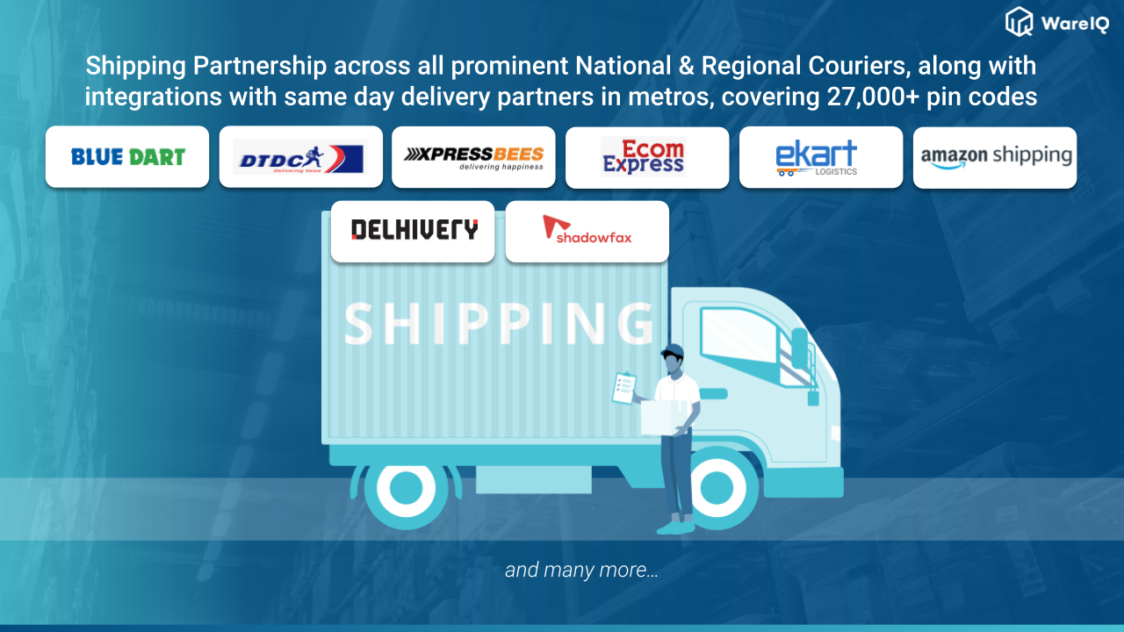
Shipping the order to the customer safely and on time has always been the priority for eCommerce businesses. But they can never ignore the affordability of the shipping charges. While companies have been tying up with eCommerce logistics providers for decades now, the pandemic has proved that loyalty is overrated. It has changed the priority from allegiance to cost and benefits.
There has been an upsurge in the spot pricing market for shipping, wherein companies shy away from long-term contracts and focus on getting the best price for their shipping right now. Another trend that is catching up is the need for business intelligence behind every shipment. Advanced tech backs every order from the origin to the customer and back.
Weight Locking
This is a great trick to avoid product weight discrepancies in order shipping services. When the eCommerce logistics partner picks up the order from the business’ warehouse, it weighs and measures the dimensions again before pushing the parcel out to the customer. Unfortunately, many times, there happen to be differences in the weight of the package due to unavoidable variations in weighing machines. There are a few useful hacks to ensure that this doesn’t happen:
- Calculate the Volumetric Weight of the shipment. This is done by multiplying the product of package dimensions in centimetres by 5000 (which may vary as per the carrier). The resulting weight will remain the same globally. For odd-sized packages, automating the weighing system helps avoid discrepancies in a manual cubic calculation.
- Associate with a supportive eCommerce logistics partner who resolves such discrepancies in a timely and effective manner.
- Click pictures while weighing the package which helps as an application of proof in case of a dispute
Order Tracking
Online retail customers want real-time information on the whereabouts of their shipments. Therefore, companies invest in advanced tech like superior order management systems to ensure effective mapping of the orders and timely communication with the customer through fulfillment statuses.
Last-Mile Delivery
It needs to offer sustainability, timeliness, safety, flexibility, real-time updates, and much more. These criteria define a significant share of a customer’s experience with an eCommerce retailer. And the statistics say that it is an essential part of customer engagement.
Moreover, peak season shipping has become a perennial trend. Customers prefer to receive their orders at home than shopping amongst huge crowds and queuing up for payments, especially during the pandemic. As a result, they push online retailers to invest heavily in last-mile delivery management software to manage last-mile deliveries and recruit and retain the right personnel.
Fast Shipping
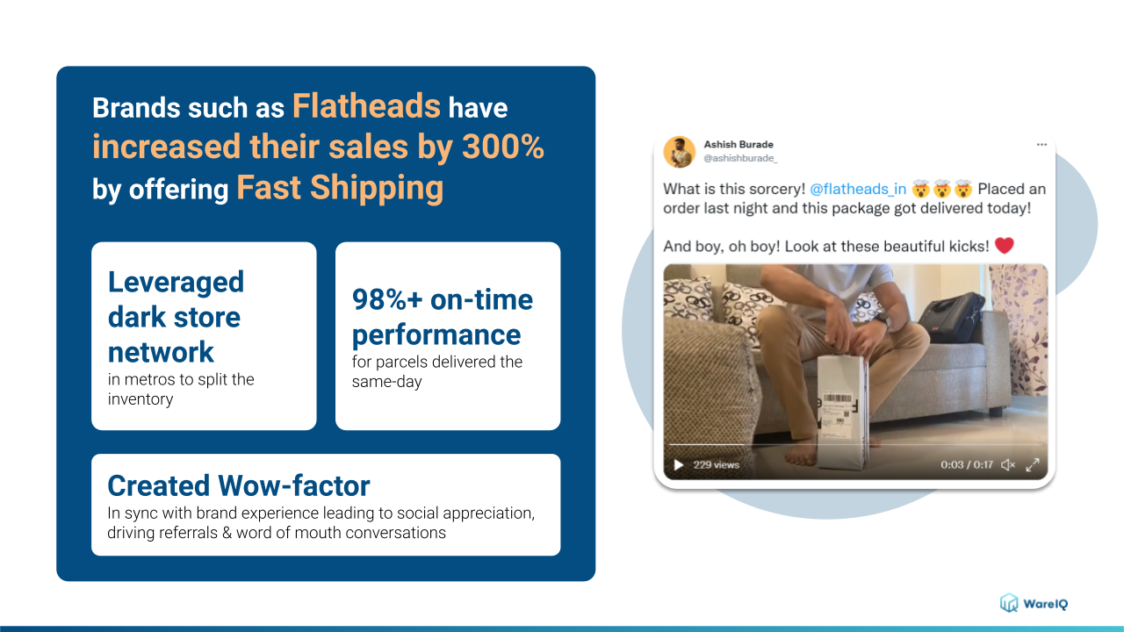
No words can stress the significance of fast shipping. Customer expectations have crossed all boundaries, pushing eCommerce companies to strive toward delivering orders within ten minutes. This scenario is in the process of making next-day delivery obsolete. This requirement has pioneered the invention of dark stores across the nation to cater to the growing demand for superfast supplies. One can only imagine how much faster it can possibly get.
Same Day & Next Day Delivery
Many eCommerce companies now focus on speedy deliveries so that customers get guaranteed next-day or even same-day delivery. Quick commerce is the next generation of online delivery systems, which enables the delivery of items within a concise time bracket of one or two days or less than 10 minutes for some business models. Convenience, delivery speed, and efficiency continue to define customer experience.
Reverse Logistics
An unsatisfied customer will initiate a return, and many eCommerce logistics companies oblige. This trend has given birth to advanced reverse logistics. Superior technology, sustainability, and creativity are driving the backward supply chain. With a high share of products bought online being returned, the eCommerce industry has been forced to revisit its return policies and invest in reverse logistics.
Conclusion: Do You Need to Outsource Your eCommerce Logistics?
eCommerce is no longer linear, and fulfillment is now Omnichannel. eCommerce customers may order online via mobile apps, phones, or online marketplaces. They may want home delivery, in-store delivery, or curbside delivery. All those fulfillment systems need to be taken care of by eCommerce logistics partners for efficacy and punctuality. eCommerce logistics strategies help to level up a business’s digital presence by bringing radical shifts in the business paradigm. Hiring a logistics partner is one such remarkable strategy. Here are a few benefits of delegating the task to an external expert.
The eCommerce industry is slated to experience massive growth and evolution in the coming years. As customer demand widens, every nook and corner of the sector will need to be organised. eCommerce businesses cannot manage these processes on their own. The expectations are too heavy to be borne solely by them. Delegation of the major parts of logistics can assist them in taking some load off. Teamwork will play a vital role in the sector’s development. Experienced players like WareIQ can lead your expansion story with creative ideas and are bound to enhance and improve supply chain processes.
WareIQ, a Y-combinator-backed eCommerce fulfillment company for same/next day delivery. We execute this by helping you store inventory closer to your customers using our platform connected to 20+ top marketplaces & D2C websites, a nationwide network of fulfillment centers, and prominent last-mile couriers. WareIQ manages the entire range of complex operations in the eCommerce fulfillment process, such as inbound functions like scanning and quality check, 100% accurate Pick and Pack, and inventory management across all channels, with a centralized platform for core fulfillment and shipping operations and post-shipping apps for a delightful experience and zero to minimal supply chain leakages.
With world-class WMS functionalities, WareIQ handles the entire range of intricate operations in the eCommerce fulfillment process, ranging from Inbound Operations such as scanning and quality check, through 100% accurate Pick and Pack, to Inventory Management across all channels. WareIQ’s next-day delivery and same-day delivery services are helping eCommerce businesses set new standards with respect to setting customer expectations and fulfilling them with high efficacy. WareIQ will definitely prove to be a more reliable and trusted long-term fulfillment partner compared to dropshipping and conventional 3PL companies.
- Pan India Fulfillment & Darkstore Network: Plug-and-play fulfillment infrastructure with no minimums, which is compliant with Amazon Seller Flex, Flipkart Assured, Myntra and other marketplaces
- Inventory & Network Planning Excellence: Best-in-class AI models for sales forecasting, product segmentation, and inventory management to reduce inventory by 40% and increase revenue by 10%.
- Vertically Integrated Fulfillment Tech Stack: Our Fulfillment Tech Solution supports integrations with 20+ top marketplaces & D2C platforms, and prominent national, regional and hyperlocal couriers, enhancing reach by covering deliveries for 27,000+ pin codes
- Supply Chain Productivity Applications: Integrate a host of supply chain productivity apps with a single-click to your existing CRMs, ERPs & accounting software to manage your logistics workflows from one command center. Use Apps like RTO Shield to get 100% RTO protection, Branded Tracking to turn your order tracking page into a profitable marketing channel, and many more.
Trusted by 300+ top Indian brands, we are helping them accelerate online sales and expedite their growth through a synergistic combination of advanced technology, robust fulfillment infrastructure & seller enablement services!WareIQ is backed by leading global investors including Y Combinator, Funders Club, Flexport, Pioneer Fund, Soma Capital, and Emles Venture Partner.
